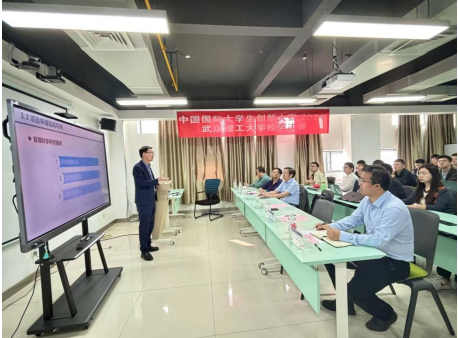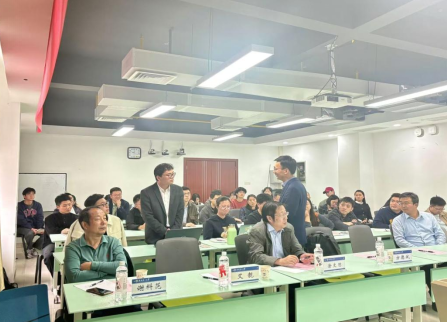On November 16, the School of Entrepreneurship held the 22nd "Feima Entrepreneurship Academic Forum" in Room 602 of the School. The forum invited Professor Fang Debin, Vice President of South-Central Minzu University and National Distinguished Young Scholars, to deliver a lecture on national funding applications and provide specialized guidance. The event was chaired by Deputy Dean Peng Huatao, and attended by Deputy Dean of the Development of Science and Technology Institute Tu Wenmao, Dean of the School of Entrepreneurship Yu Ping, Deputy Dean of the School of Entrepreneurship Ai Liang, Professor Xie Kefan from the School of Management, and representatives of faculty and students from the School of Entrepreneurship.
Before the forum officially began, Deputy Dean Peng Huatao introduced Professor Fang Debin to the attendees. Professor Fang is a Standing Committee Member of the Party Committee and Vice President of South-Central Minzu University, as well as a Specially Appointed Professor at Wuhan University. He was awarded the National Science Fund for Distinguished Young Scholars in 2017 and has been a chief expert for major national social science projects. He is also an expert under the State Council's special allowance and a member of Wuhan University's Academic Committee. Professor Fang has published over 100 papers in SSCI, SCI, and core journals such as EJOR and Management World, and has led more than 40 projects, including key projects of the National Natural Science Foundation. He has received 10 national and provincial-level awards. Afterward, Deputy Dean Tu Wenmao of the Development of Science and Technology Institute delivered a welcome address, offering advice on the research work of the School of Entrepreneurship and expressing expectations for the faculty's funding applications.

Professor Fang Debin shared his valuable experience in the project application, drawing from his own project application experiences. He also provided unique insights as a funding reviewer. He meticulously analyzed key elements such as project justification, research objectives, research content, and feasibility analysis. He clearly outlined the overall framework and logical structure of writing an application proposal. Professor Fang emphasized the importance of maintaining internal coherence and logical relationships between different sections of the proposal to ensure that the entire document is coherent, well-organized, and leaves a lasting impression on the reviewers.
During the interactive session, Professor Fang engaged in in-depth discussions with the attendees, answering questions related to writing funding applications, project selection, and research methods. He encouraged everyone to be bold in attempting new ideas and innovations, continuously improving their research abilities and application quality. Finally, Professor Fang provided one-on-one guidance on the proposal drafts written by some faculty members, offering targeted suggestions on improving the depth, breadth, structure, and clarity of their submissions.

This forum not only broadened the academic horizons of the faculty and students but also provided valuable insights into the funding application process. Attendees expressed that they would use the lecture as an opportunity to further enhance their research capabilities, improve the quality of their funding applications, and contribute to advancing the School’s research work to a higher level, supporting the continuous development and breakthroughs in academic discipline construction.
Written by: Li Wanqing
Reviewed by: Peng Huatao